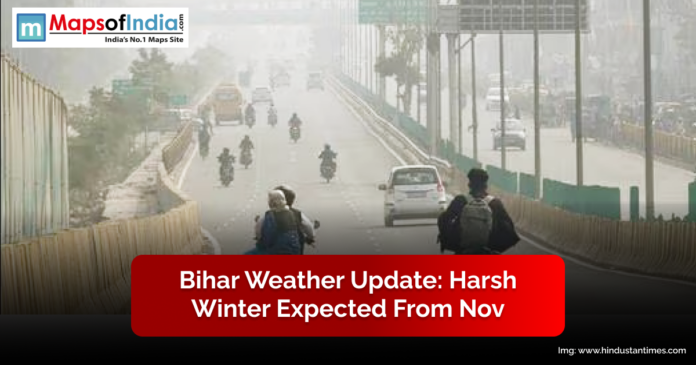Bihar is experiencing a perceptible decrease in temperatures, with cold mornings and evenings becoming a regular phenomenon throughout the state. Experts opine that this pre-winter cold spell is a clear indication that winter is knocking on the door, and people should get ready for tougher times from November. The latest reports indicate that nights will continue to become colder, but the day temperatures will remain comparatively moderate, producing a wide temperature difference between day and night.
Meteorologists prove that the winter season in Bihar typically starts in early November and lasts up until mid-March. In this period, the temperatures can plummet suddenly, particularly in the northern and western regions of the state. Cold waves, locally referred to as “Sheet-lahar,” are likely to strike the state, bringing with them an increased cold during early morning and late evening hours. These conditions require that the residents, particularly the residents of rural areas, implement protective strategies such as wearing warm clothing, blankets, and other heating agents.
The authorities have also prepared the schools, hospitals, and local governments for the winter months. The groups that are vulnerable to the effects of winter, such as children, older citizens, and people with respiratory or cardiovascular health problems, are more at risk during the onset of winter. The state government can make recommendations and provide information on how to cope with cold-related health hazards, such as how to keep oneself warm, how to eat correctly, and how to stay away from frost and chill winds.
Apart from individual preparedness, farmers are being urged to cover winter crops against frost and take care to adjust irrigation timings for the cold weather. Agriculture as an industry is most vulnerable to unseasonal drops in temperature, and an early warning can reduce the likely damage to crops like wheat, mustard, and vegetables. Farmers are also being prompted to employ protective covers on crops and animals to avoid losses.
The authorities have also prepared the schools, hospitals, and local governments for the winter months. The groups that are vulnerable to the effects of winter, such as children, older citizens, and people with respiratory or cardiovascular health problems, are more at risk during the onset of winter. The state government can make recommendations and provide information on how to cope with cold-related health hazards, such as how to keep oneself warm, how to eat correctly, and how to stay away from frost and chill winds.
Apart from individual preparedness, farmers are being urged to cover winter crops against frost and take care to adjust irrigation timings for the cold weather. Agriculture as an industry is most vulnerable to unseasonal drops in temperature, and an early warning can reduce the likely damage to crops like wheat, mustard, and vegetables. Farmers are also being prompted to employ protective covers on crops and animals to avoid losses.










